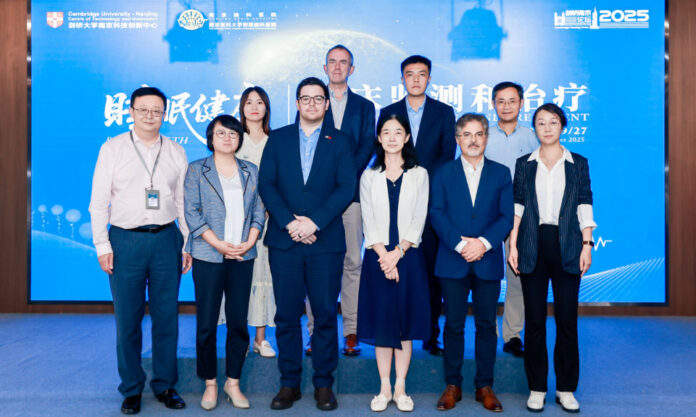Since we spend 30 percent of our lives doing it (or the lucky ones among us at least), sleep and problems associated therewith are a big deal. Hence the importance of a globally-relevant forum held recently in Nanjing, with the UK’s Cambridge University as backdrop.
Held on 27 September, the “Cambridge Nanjing Forum 2025 – Sleep Health and Clinical Monitoring and Treatment” jointly organised by Cambridge University Nanjing Centre of Technology & Innovation and Nanjing Brain Hospital, was centred around innovations in sleep health technology and their clinical applications, combining field visits with specialised seminars.
The event brought together experts and scholars from leading Sino-British institutions including the University of Cambridge, Royal Papworth Hospital NHS Foundation Trust, Nanjing Brain Hospital, Nanjing Medical University and Fudan University.
With approximately 80 guests attending in person and over 500 viewers online, among those in attendance were Ryan Burtonwood, Consul at the British Consulate-General Shanghai; and Daping Chu, Tenured Chair Professor of the University of Cambridge, and the Academic Director and CEO of the CUNJC.
While data-driven approaches and intelligent algorithms today reshape the landscape of healthcare, when it comes to sleep, it is in many cases, AI providing both innovation and practical pathways for sleep monitoring, intervention and treatment.
After welcomes from the dignitaries present, there followed VIP keynote speeches, such as that from Luigi G. Occhipinti, Director of Research in Smart Electronics, Biosystems and AI with the Department of Engineering at the University of Cambridge, who introduced a smart garment which accurately identifies conditions such as sleep apnea with over 95 percent accuracy.
There then came Dean Li Zhang, Deputy Dean and Chief Physician of Geriatrics Department, Nanjing Brain Hospital, highlighting that sleep disorders affect 38.2 percent of the Chinese population. Interestingly, such are closely associated with neurological diseases including Parkinson’s and Alzheimer’s.
Home-based, blood-oxygen monitoring was that which followed on Saturday afternoon’s agenda, as Ian Smith, Medical Director of Royal Papworth Hospital NHS Foundation Trust, UK, systematically elaborated on pragmatic strategies adopted in East Anglia to address the high incidence of Obstructive Sleep Apnoea (OSA).
Next up, the focus was homeostasis within the central nervous system, as Ming Xiao, Principal Investigator at the Jiangsu Province Key Laboratory of Neurodegeneration, School of Basic Medical Science at Nanjing Medical University, talked of the critical role that the glymphatic system plays in clearing metabolic waste from the brain.
Ever heard of “Sleep Staging”? Yana Wei, Principal Investigator at the Institute for Brain and Intelligence at Fudan University, delved into the topic highlighting that sleep-stage transitions constitute a gradual dynamic process involving progressive changes in cortical activity, rather than an abrupt switch.
Last but not least, Haochen Liu, Research Assistant in the Department of Computer Science and Technology at the University of Cambridge, outlined their utilisation of advanced-machine learning algorithms to achieve automated and objective assessments of sleep quality.
Looking back, this forum successfully brought together the forces of research and clinical practice, connecting the needs of commerce in relation to technological innovation. But it was also much more than just a symbolic get together; it was a demonstration that UK-China relations remain as strong as ever.









